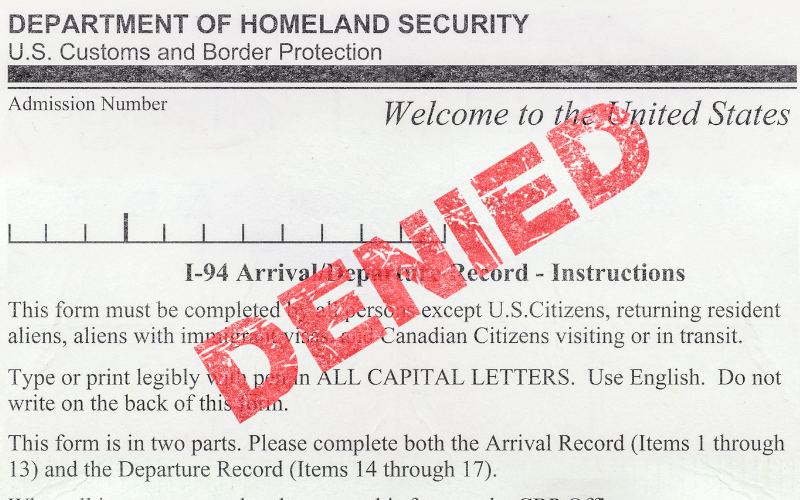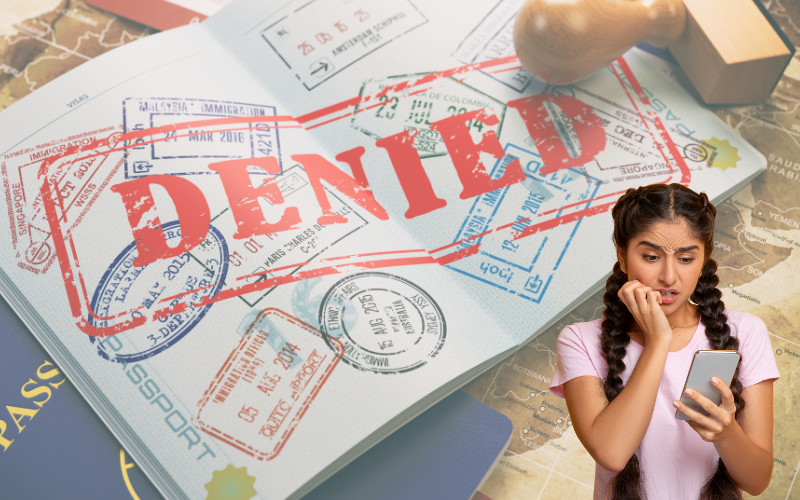Visa Rejection Reasons: Navigating Common Challenges in Global Travel
Embarking on the journey of studying abroad is a transformative experience, yet one of the most significant hurdles for students is navigating the complex visa application process. This blog aims to shed light on the various reasons that can lead to student visa rejections. Understanding these reasons is crucial for students who aspire to study in countries like the United States, the UK, Canada, the Schengen Area, and beyond.
We explore a range of factors that can lead to visa denials, from paperwork inaccuracies and financial issues to more nuanced aspects like insufficient ties to one’s home country or unclear study plans. This guide not only helps students who have faced rejection but also serves as a proactive resource for future applicants. By providing insights into the common challenges and offering advice on how to address potential issues, this blog is designed to guide students through the intricacies of the visa application process, helping them to successfully secure their passage to international education opportunities.
What is Visa Rejection?
Visa rejection is a situation where a country’s consulate or embassy decides not to grant a visa to an applicant. This decision is typically based on various criteria set by the country’s immigration laws and policies. When a visa application is rejected, it means the applicant has not met the necessary requirements or has failed to provide satisfactory evidence to support their application.
Visa rejection differs from visa denial, which occurs before the application is fully processed, often due to incomplete applications or missing documents. In contrast, a visa rejection happens after the application has been fully reviewed and indicates that the consulate has found specific reasons based on the information provided to not grant the visa.
It’s important to note that a visa rejection is not necessarily permanent. Applicants often have the opportunity to reapply, especially if they can address the reasons for rejection in future applications.
Turning Rejections into Approvals: Trust AdmitKard’s Expertise!
15 Common Visa Rejection Reasons: Insights to Enhance Your Application
1. Incomplete Application or Documentation
Visa applications can be rejected if they are incomplete or lack essential documents. This includes missing forms, insufficient supporting documents, or not adhering to specific requirements. It’s crucial to double-check all paperwork and ensure every required piece of information is accurately and fully provided.
2. Insufficient Funds or Financial Proof
Applicants must demonstrate they have sufficient financial resources to support themselves during their stay. This involves providing bank statements or financial guarantees. Rejection can occur if the consulate is not convinced of the applicant’s financial stability or ability to fund their visit.
3. Invalid Passport or Travel Document Issues

A valid and up-to-date passport is essential. Rejections can happen if the passport is expiring soon, damaged, or lacks blank pages for stamps. Ensuring your passport is in good condition and valid for a significant period beyond your intended stay is critical.
4. Misinformation or Fraudulent Documents
Providing false information or submitting forged documents leads to immediate rejection. This includes falsified bank statements, employment letters, or personal information. Honesty and transparency in all documentation and during the interview process are paramount.
5. Failure to Meet Health Standards
Countries have health standards that applicants must meet. This could include vaccinations, health certificates, and being free from contagious diseases. Failure to meet these health requirements, or not providing proof of good health, can result in visa denial.
6. Criminal History or Security Concerns
A past criminal record or any indication of a security threat can lead to visa rejection. This includes minor offenses or suspicions of involvement in criminal activities. Background checks are routine, and any security concerns are taken seriously.
7. Previous Immigration or Visa Violations
A history of overstaying a visa or violating immigration laws in any country can negatively impact your application. This shows a disregard for immigration rules and raises concerns about future compliance.
8. Weak Ties to Home Country
Consulates look for strong ties to the applicant’s home country, such as family, employment, or property, as assurance they will return. Weak ties or lack of compelling reasons to return can lead to suspicions of potential overstay.
9. Lack of Travel History
A sparse travel history can sometimes be perceived negatively, as it might indicate unfamiliarity with international travel norms or raise questions about the applicant’s travel intentions.
10. Unclear Travel Itinerary or Purpose
Applicants must provide a clear and credible travel plan. Vague or ambiguous itineraries, or unclear purposes of visit, can raise doubts about the applicant’s intentions and result in visa rejection.
11. Poor Interview Performance

The visa interview is crucial. Poor performance, such as inability to answer questions confidently, appearing nervous, or giving inconsistent answers, can lead to doubts about the applicant’s intentions and result in visa denial.
12. Risk of Overstay or Illegal Employment
If there’s a suspicion that the applicant might overstay their visa or seek unauthorized employment, it can lead to rejection. Consulates assess various factors to determine this risk, including the applicant’s economic situation and ties to their home country.
13. Visa Quotas or Country-Specific Restrictions
Some countries have annual visa quotas or specific restrictions that can affect the likelihood of obtaining a visa. These quotas or restrictions might be based on diplomatic relations, immigration trends, or reciprocal visa agreements.
14. Political or Diplomatic Considerations
At times, broader political or diplomatic relations between countries can influence visa decisions. These considerations are often beyond the applicant’s control but can play a role in the visa approval process.
15. Errors in Visa Type or Category
Applying for the wrong visa type can lead to rejection. Each visa category has specific requirements and purposes, and selecting the wrong one can demonstrate a misunderstanding of visa regulations or an applicant’s travel intent.
Empower Your Travel Dreams: Choose AdmitKard for Visa Triumphs!
How to Check Visa Rejection Status?
You can check the status of your visa by browsing the website of the consulate of the particular country. Here you have to give certain details, including –
- Interview location
- The tracking number provided during the visa interview
- Application ID
- Passport Number
How to check visa rejection reasons?
If you’re uncertain about the reasons behind your visa rejection, there’s no need to worry.
When a visa is refused, the consulate will issue a letter detailing the grounds for refusal. This information is crucial as it guides you on how to rectify any issues before reapplying after a certain period.
Furthermore, many consulate websites offer access to visa status and reasons for rejection. However, be aware that third-party websites may not provide detailed reasons for the rejection online.
By steering clear of the common reasons for visa rejection and closely following the guidelines on the consulate’s website, you can significantly improve your chances of visa approval.
Keep in mind, submitting fraudulent documents or false information can have lasting consequences on your eligibility for a visa, potentially leading to permanent ineligibility.
Ready to embark on your international study journey without the worry of visa rejection? Visit AdmitKard now! Our experts are here to guide you through every step of the application process, ensuring your visa application is error-free and compliant. Don’t let visa complications hold you back – unlock your global education dreams with AdmitKard today!
Frequently asked questions for Visa rejection reasons
What are the Common Canada Visa Rejection Reasons?
Common Canada visa rejection reasons encompass incomplete or inaccurate applications, inadequate financial proof, insufficient ties to the home country, and submission of fraudulent information. Additional factors include a negative travel history, health or security concerns, and failing to meet the specific visa category requirements. Ensuring completeness, accuracy, and transparency in your application is vital to address these issues.
What are the Main UK Visa Rejection Reasons?
UK visa rejection reasons typically include insufficient financial evidence, failure to prove strong ties to the home country, lack of clarity in travel itinerary, submitting incorrect or incomplete application forms, and providing misleading information. Other reasons involve concerns about the applicant overstaying, past immigration violations, and failing to meet the specific criteria of the visa category applied for. It’s crucial to provide comprehensive, accurate information and documentation to mitigate these common rejection factors.
Embark on a Visa Success Journey – Start with AdmitKard Today!
What are the Key Schengen Visa Rejection Reasons?
Schengen visa rejection reasons often involve incomplete or incorrectly filled applications, inadequate proof of financial means, unclear travel purpose or itinerary, lack of travel insurance, and insufficient ties to the applicant’s home country. Other common factors include past visa or immigration violations, doubts about the intention to leave the Schengen area before visa expiry, and security or health concerns. Providing complete, accurate, and clear documentation is essential to address these issues.
What are the Primary US Visa Rejection Reasons?
US visa rejections typically stem from insufficient ties to the home country, suggesting potential overstay, inadequate financial resources, incorrect or incomplete application forms, and providing misleading information. Other reasons include a history of immigration law violations, doubts about the true purpose of the visit, health or security concerns, and failure to comply with the specific visa category requirements. Ensuring thorough and honest documentation is key to overcoming these common obstacles.
What are the Common New Zealand Visa Rejection Reasons?
New Zealand visa rejections often occur due to incomplete applications, insufficient financial means, lack of strong ties to the home country, and submission of false or misleading information. Other factors include a negative travel or immigration history, unclear travel plans, health concerns, and security issues. It’s important for applicants to provide detailed, accurate, and truthful information, along with all required documentation, to address these potential issues.
What are the Main France Visa Rejection Reasons?
France visa rejections typically arise from incomplete or incorrect application forms, inadequate financial proof, unclear travel itineraries, and insufficient ties to the applicant’s home country. Other reasons include providing misleading or fraudulent information, past immigration or visa violations, health concerns, and security risks. It’s essential for applicants to meticulously prepare their documentation, ensuring accuracy and completeness, to avoid these common issues.
What are the Frequent Ireland Visa Rejection Reasons?
Ireland visa rejections often occur due to incomplete applications, insufficient financial resources, lack of strong ties to the applicant’s home country, and submission of false or misleading information. Other factors contributing to rejection include a negative immigration history, unclear purpose of visit, health concerns, and security issues. Providing detailed, accurate, and truthful information in the application is crucial to address these challenges.





Comments (0)